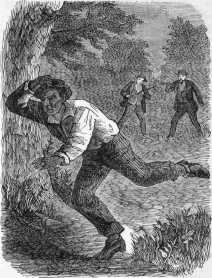The Underground Railroad
Arrival from Virginia, 1858
ALFRED S. THORNTON.
The subject of this sketch was a young man about twenty-two years of age, of dark color, but bright intellectually. Alfred found no fault with the ordinary treatment received at the hands of his master; he had evidently been on unusually intimate terms with him. Nor was any fault found with his mistress, so far as her treatment of him was concerned; thus, comparatively, he was “happy and contented,” little dreaming of trader or a change of owners. One day, to his utter surprise, he saw a trader with a constable approaching him. As they drew nearer and nearer he began to grow nervous. What further took place will be given, as nearly as possible, in Alfred’s own words as follows:
“William Noland (a constable), and the trader was making right up to me almost on my heels, and grabbed at me, they were so near. I flew, I took off-my hat and run, took off my jacket and run harder, took off my vest and doubled my pace, the constable and the trader both on the chase hot foot. The trader fired two barrels of his revolver after me, and cried out as loud as he could call, G——d d——n, etc., but I never stopped running, but run for my master. Coming up to him, I cried out, Lord, master, have you sold me? ‘Yes,’ was his answer. ‘To the trader,’ I said. ‘Yes,’ he answered. ‘Why couldn’t you sold me to some of the neighbors?’ I said. ‘I don’t know,’ he said, in a dry way. With my arms around my master’s neck, I begged and prayed him to tell me why he had sold me. The trader and constable was again pretty near. I let go my master and took to my heels to save me. I run about a mile off and run into a mill dam up to my head in water. I kept my head just above and hid the rest part of my body for more than two hours. I had not made up my mind to escape until I had got into the water. I run only to have little more time to breathe before going to Georgia or New Orleans; but I pretty soon made up my mind in the water to try and get to a free State, and go to Canada and make the trial anyhow, but I didn’t know which way to travel.”
 Such great changes in Alfred’s prospects having been wrought in so short a while, together with such a fearful looking-for of a fate in the far South more horrid than death, suddenly, as by a miracle, he turns his face in the direction of the North. But the North star, as it were, hid its face from him. For a week he was trying to reach free soil, the rain scarcely ceasing for an hour. The entire journey was extremely discouraging, and many steps had to be taken in vain, hungry and weary. But having the faith of those spoken of in the Scriptures, who wandered about in dens and caves of the earth, being destitute, afflicted and tormented, he endured to the end and arrived safely to the Committee.
Such great changes in Alfred’s prospects having been wrought in so short a while, together with such a fearful looking-for of a fate in the far South more horrid than death, suddenly, as by a miracle, he turns his face in the direction of the North. But the North star, as it were, hid its face from him. For a week he was trying to reach free soil, the rain scarcely ceasing for an hour. The entire journey was extremely discouraging, and many steps had to be taken in vain, hungry and weary. But having the faith of those spoken of in the Scriptures, who wandered about in dens and caves of the earth, being destitute, afflicted and tormented, he endured to the end and arrived safely to the Committee.
He left his father and mother, both slaves, living near Middleburg, in Virginia, not far from where he said his master lived, who went by the name of C.E. Shinn, and followed farming. His master and mistress were said to be members of the “South Baptist Church,” and both had borne good characters until within a year or so previous to Alfred’s departure. Since then a very serious disagreement had taken place between them, resulting in their separation, a heavy lawsuit, and consequently large outlays. It was this domestic trouble, in Alfred’s opinion, that rendered his sale indispensable. Of the merits of the grave charges made by his master against his mistress, Alfred professed to have formed no opinion; he knew, however, that his master blamed a school-master, by the name of Conway, for the sad state of things in his household. Time would fail to tell of the abundant joy Alfred derived from the fact, that his “heels” had saved him from a Southern market. Equally difficult would it be to express the interest felt by the Committee in this passenger and his wonderful hair-breadth escape.

